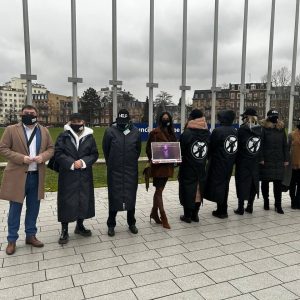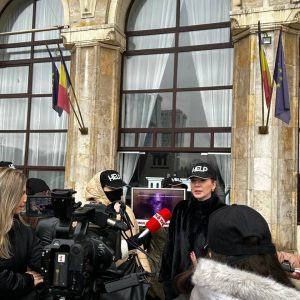On Tuesday, a group of journalists from Moldova protested in front of the European Parliament in Brussels (see picture), calling for an end to the media ban imposed in Moldova, which involves a broad ban on six TV channels in the country. In response, an association, “Stop Media Ban“, was formed, with representatives engaging with several MEPs to raise awareness on the topic.
The leader of the “Stop Media Ban” association, Alexei Lungu, comments in a press release (also below):
“Today Moldova is entering a dangerous path. We have a lot of double standards – while our government claims Moldova’s commitment to the European values and the European future, it doesn’t respect the fundamental values of free press and the rule of law in the country. Our government launched an opposition suppression campaign, no diversity of views and opinions is allowed, the independent media in under threat and with it – our future as a Western democratic country.”
In a letter to MEPs, Lungu explains the matter in more detail:
“Stop Media Ban is an association of journalists and media members established in the aftermath of the wide media ban across six (6) Television channels in Moldova. On 16 December 2022, the Commission for Exceptional Situations recalled our streaming licenses accusing our channels of streaming Russian propaganda and not featuring “enough” the war in Ukraine.
In reality, our channels were banned because we speak out when our government is in the wrong. We do not sit silent when the opposition is taking steps to improve the life in the community. As the code of journalist profession requires, we always present all sides to the story, yet sometimes our elected leaders refuse to talk to press they deem as “opposition”.
Since the ban, 150 families lost a source of income, and the Moldovan population lost their right to hear the other side of the story.
In February 2023, a poll among the Moldovan population, “Socio-Political Barometer”, showed that 68% of those interviewed believe the decision of the Commission for Exceptional Situations to suspend the licenses for the six television stations is an abuse on the part of the current power.
We stream entertainment content such as TV series and talk shows from a wide range of neighboring countries, including Russia, Ukraine, and Turkey. We cover the war in Ukraine and our channel became a home to Ukrainian journalists relocating to Moldova. We speak out when we see that our elected leaders lose sight of their way as it should be in a democratic setting.
Until now, our courts have not reached decision as to which instance should try our case, our journalists have been receiving threatening messages, and meanwhile — the democracy in Moldova remains at risk. As a country holding the status of candidate to join the European Union, Moldova cannot sustain policies that hurt its democracy, the rule of law, and freedom of the press.
We kindly ask for your availability to for an in-person meeting in the European Parliament in Brussels during Tuesday, 21 March or Wednesday March 22nd, to hear our case.
Together, we need to stand up for the future of free speech and democracy – what is happening now in Moldova can happen in the whole of Europe tomorrow.”


FULL PRESS RELEASE:
An association of independent journalists protests in the EU to stop media ban in Moldova
On Tuesday, 21 March, a group of independent journalists gathered to protest in front of the European Parliament in Brussels with a call to stop media ban in Moldova. An association, Stop Media Ban, was formed following a broad ban across six TV channels in Moldova. Following the protest, the group engaged with the several Members of the European Parliament to raise awareness of the current threats the media is facing in Moldova.
“Today Moldova is entering a dangerous path. We have a lot of double standards – while our government claims Moldova’s commitment to the European values and the European future, it doesn’t respect the fundamental values of free press and the rule of law in the country. Our government launched an opposition suppression campaign, no diversity of views and opinions is allowed, the independent media in under threat and with it – our future as a Western democratic country.” said the leader of the Stop Media Ban association Alexei Lungu.
On 16 December 2022, the Commission for Exceptional Situations suspent streaming licenses of six opposition channels due to ungrounded accusations of streaming propaganda content and disinformation. The Decision no. 54 states that the Commission suspends the licenses of 6 (six) television channels with national coverage for the period of the state of emergency, based on “multiple violations of the Code on Audiovisual Media Services due to incorrect information reflecting national events and the war in Ukraine.” The decision was appealed in court, however the first instance, appeal, and high courts are deliberating which instance should try the case to this date.
“According to the media streaming regulations, 80% of the streamed content must be streamed in the Romanian language, which has been the rule across all TV channels. We have not received fines for breaching the language rule. The foreign content included in the programming, were Ukrainian, Turkish, and Russian television series that is done in purely entertainment purposes – which is also streamed across government friendly channels whose streaming licenses have not been suspended,” stated Lungu.
In January, the journalists of the banned channels have visited the Council of Europe in Strasbourg and the Parliament in Bucharest, Romania. After the meetings in Bucharest and the Council of Europe, public and hidden threats began to come in towards journalists and TV channels. Igor Grosu -the Speaker of the Parliament of Republic of Moldova, stated publicly that he plans to intervene in the online broadcasts of these TV stations. A leader of the organization Stop Media Ban and a leading journalist in Moldova, Alexei Lungu, received several threats from anonymous sources, claiming he “won’t meet 2024 if [he] doesn’t stop the insanity.”
In February 2023, a poll among the Moldovan population, “Socio-Political Barometer”, showed that 68% of those interviewed believe the decision of the Commission for Exceptional Situations to suspend the licenses for the six television stations is an abuse on the part of the current power.
“The decision of the Commission has a purely political motive. If you do not fully 100% support the current government, you automatically become the enemy. Many of our neighboring countries have faced a crackdown on the independent media and we see the consequences: more and more countries spin toward authoritarian rule under the pretense of democracy. Let’s not allow Moldova to be next.”
“Being a journalist is not just a job – we carry on a special mission to encourage our elected leaders to do better and represent the voices of every member of our society, not just those of the government,” added Lungu.
Stop Media Ban is an association of journalists and media workers established in the aftermath of the broad media ban across Moldovan TV channel. The organization’s mission is to raise awareness about the repressions on press and media in Moldova and worldwide.
Learn more at Stop Media Ban

